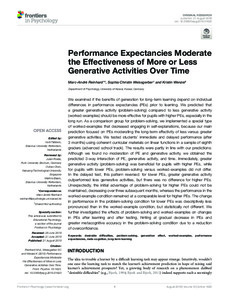| dc.date.accessioned | 2019-09-04T06:33:25Z | |
| dc.date.available | 2019-09-04T06:33:25Z | |
| dc.date.issued | 2019-08-21 | |
| dc.identifier | doi:10.17170/kobra-20190903643 | |
| dc.identifier.uri | http://hdl.handle.net/123456789/11292 | |
| dc.description.sponsorship | Gefördert durch den Publikationsfonds der Universität Kassel | ger |
| dc.language.iso | eng | eng |
| dc.rights | Urheberrechtlich geschützt | |
| dc.rights.uri | https://rightsstatements.org/page/InC/1.0/ | |
| dc.subject | desirable difficulties | eng |
| dc.subject | problem-solving | eng |
| dc.subject | generation effect | eng |
| dc.subject | worked-examples | eng |
| dc.subject | performance expectancies | eng |
| dc.subject | meta-cognition | eng |
| dc.subject | long-term learning | eng |
| dc.subject.ddc | 150 | |
| dc.title | Performance Expectancies Moderate the Effectiveness of More or Less Generative Activities Over Time | eng |
| dc.type | Aufsatz | |
| dcterms.abstract | We examined if the benefits of generation for long-term learning depend on individual differences in performance expectancies (PEs) prior to learning. We predicted that a greater generative activity (problem-solving) compared to less generative activity (worked-examples) should be more effective for pupils with higher PEs, especially in the long run. As a comparison group for problem-solving, we implemented a special type of worked-examples that decreased engaging in self-explanations, because our main prediction focused on PEs moderating the long-term effectivity of less versus greater generative activities. We tested students’ immediate and delayed performance (after 3 months) using coherent curricular materials on linear functions in a sample of eighth graders (advanced school track). The results were partly in line with our predictions: Although we found no moderation of PE and generative activity, we obtained the predicted 3-way interaction of PE, generative activity, and time. Immediately, greater generative activity (problem-solving) was beneficial for pupils with higher PEs, while for pupils with lower PEs, problem-solving versus worked-examples did not differ. In the delayed test, this pattern reversed: for lower PEs, greater generative activity outperformed less generative activities, but there was no difference for higher PEs. Unexpectedly, the initial advantage of problem-solving for higher PEs could not be maintained, decreasing over three subsequent months, whereas the performance in the worked-example condition remained at a comparable level for higher PEs. The change in performance in the problem-solving condition for lower PEs was descriptively less pronounced than in the worked-example condition, but statistically not different. We further investigated the effects of problem-solving and worked-examples on changes in PEs after learning and after testing, hinting at gradual decrease in PEs and greater metacognitive accuracy in the problem-solving condition due to a reduction of overconfidence. | eng |
| dcterms.accessRights | open access | |
| dcterms.creator | Reinhard, Marc-André | |
| dcterms.creator | Weißgerber, Sophia Christin | |
| dcterms.creator | Wenzel, Kristin | |
| dc.relation.doi | doi:10.3389/fpsyg.2019.01623 | |
| dc.type.version | publishedVersion | |
| dcterms.source.identifier | ISSN: 1664-1078 | |
| dcterms.source.journal | Frontiers in psychology | eng |
| dcterms.source.pageinfo | 1623 | |
| dcterms.source.volume | Vol. 10 | |

